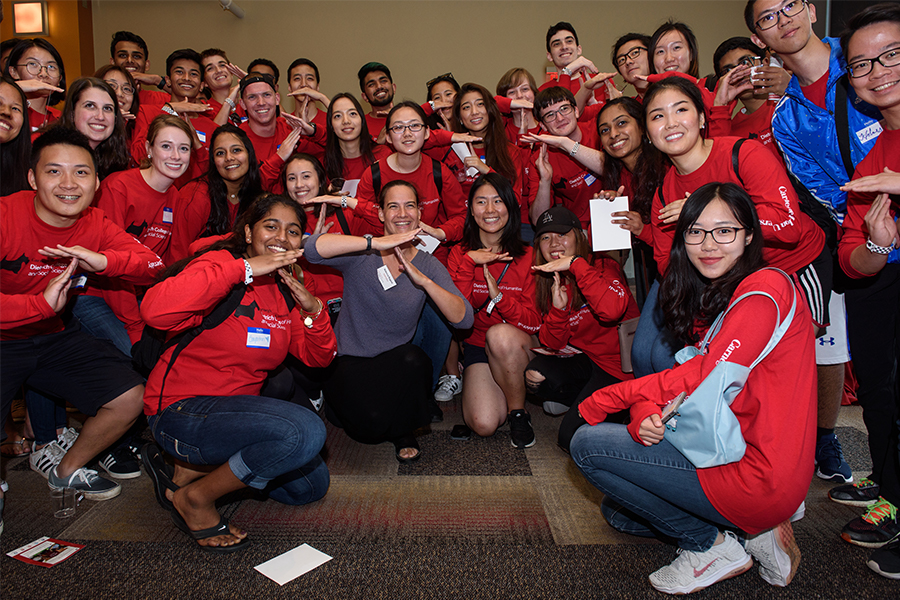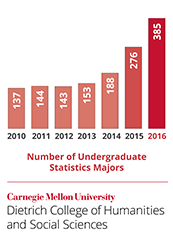
Soaring Demand for Data Science Drives Dietrich College Momentum
By Shilo Rea
As the sophisticated use of digital information transforms business and daily life, an innovative approach to data science across academic fields is fueling a popularity boom at Carnegie Mellon University’s Dietrich College of Humanities and Social Sciences, in what was once a quiet corner of the academy: Statistics.
Dietrich’s College’s Department of Statistics and Data Science—a global leader in applying statistics to many areas of science, technology, policy and education—is among the fastest growing statistics programs in the nation.
 The number of undergraduate statistics majors has nearly quadrupled since 2010 and has grown more than twenty-fold since 2005. And since 2013, the Dietrich College applicants who indicated interest in studying statistics have more than doubled.
The number of undergraduate statistics majors has nearly quadrupled since 2010 and has grown more than twenty-fold since 2005. And since 2013, the Dietrich College applicants who indicated interest in studying statistics have more than doubled.
“Our statisticians and data scientists exemplify the Carnegie Mellon approach to the humanities and social sciences, which infuses foundational and deep research across disciplines to take on and offer solutions for issues that are important to the world today,” said Richard Scheines, dean of the Dietrich College.
In many institutions, statistics is not associated with the humanities or social sciences. But at Carnegie Mellon, where it is situated in the Dietrich College and applied in unexpected fields, this innovative approach is helping drive an unusual rise in the portion of admitted students choosing the university over its competitors.
Students at every level in the Department of Statistics and Data Science engage with interdisciplinary, real-world problems and gain extensive experience working with actual data. Recent projects analyzed domestic violence incidents and county response services, predicted yearly revenue streams for companies, visualized city crime reports, investigated if communal coping affects diabetes treatment and determined the impact of filtering tweets for social unrest.
“For the past 50 years, we have made a big impact in both statistical theory and applying those theories to real problems and real data in fields from genetics and astronomy to sports and finance,” said Christopher Genovese, head of the Statistics and Data Science Department. “Data challenges are everywhere, and the demand for professionals to effectively approach them from a statistical way of thinking, with the best tools and techniques, is going to keep growing.”
Graduates from the Statistics and Data Science Department are finding success in many different industries. Roughly 10-20 percent of recent undergraduate statistics majors have gone on to graduate or professional school. The rest are getting jobs predominately in finance and banking, consulting, analytics, management and marketing.
Samuel Ventura, who got his bachelor’s, master’s and doctoral degrees in statistics from CMU, is now the Pittsburgh Penguins’ director of hockey research. It’s his job to collect and use data to increase the team’s chances of winning.
“My first foray into taking complex data sets and trying to make something of them was when I was a rising junior working with Bill Eddy on a neuroscience project,” Ventura said. “As a graduate student, I got involved with statistics in sports, and our published papers and projects—like War on Ice—gave us notoriety in the academic and sports analytic worlds.”
One strategy the department is using to keep pace with the demands and evolve for the future is to build on and highlight connections between statistics and other fields by offering joint majors, such as with economics and machine learning, and specific tracks in neuroscience and mathematical sciences. Future additions may include tracks in data science and machine learning, curriculum refinements to broaden students’ exposure to real, large-scale data and redeveloping how computing is taught.
“Our curriculum is designed to give students a taste and a wide variety of experiences of what it is like to do statistics and data science in the real world. We take problems that are real—from research, industry and government—and put them straight into the classroom,” said Rebecca Nugent, associate department head and director of undergraduate studies.
Learn more about CMU’s incoming class.
Top photo: Members of the Dietrich College of Humanities and Social Sciences’ Class of 2017 strike a pose by creating T-Test symbols with Rebecca Nugent, associate head of the Department of Statistics and Data Science, at the Heinz History Center during Orientation Week.